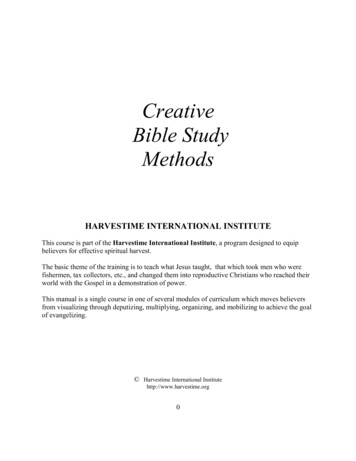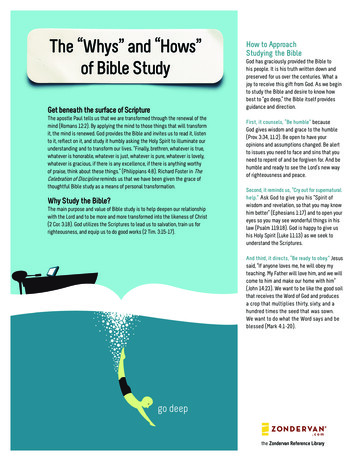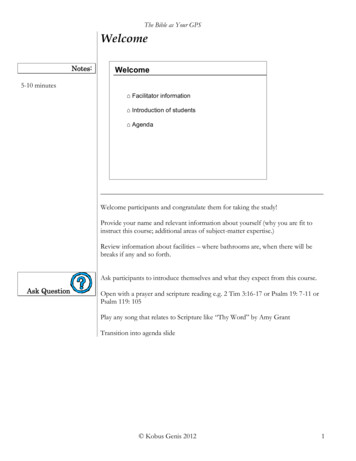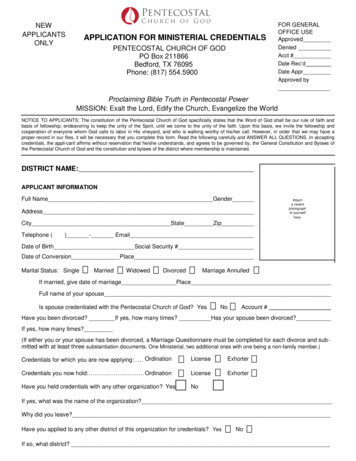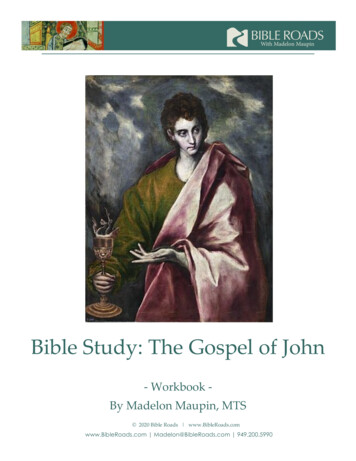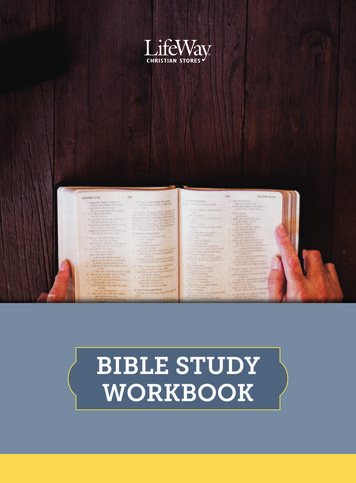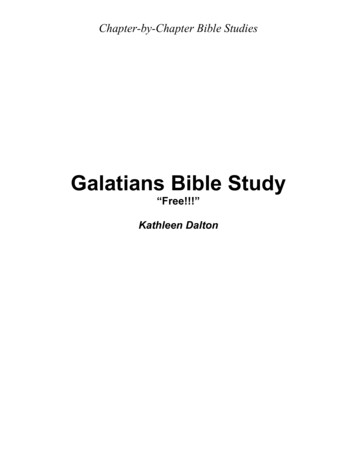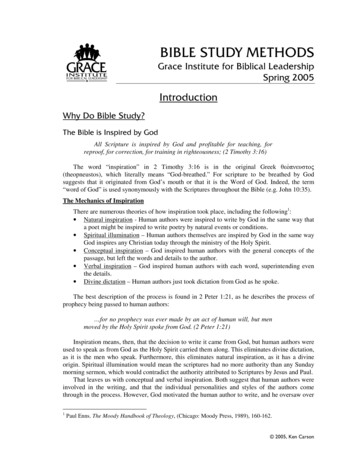
Transcription
!!"# % All Scripture is inspired by God and profitable for teaching, forreproof, for correction, for training in righteousness; (2 Timothy 3:16)The word “inspiration” in 2 Timothy 3:16 is in the original Greek(theopneustos), which literally means “God-breathed.” For scripture to be breathed by Godsuggests that it originated from God’s mouth or that it is the Word of God. Indeed, the term“word of God” is used synonymously with the Scriptures throughout the Bible (e.g. John 10:35).The Mechanics of InspirationThere are numerous theories of how inspiration took place, including the following1: Natural inspiration - Human authors were inspired to write by God in the same way thata poet might be inspired to write poetry by natural events or conditions. Spiritual illumination – Human authors themselves are inspired by God in the same wayGod inspires any Christian today through the ministry of the Holy Spirit. Conceptual inspiration – God inspired human authors with the general concepts of thepassage, but left the words and details to the author. Verbal inspiration – God inspired human authors with each word, superintending eventhe details. Divine dictation – Human authors just took dictation from God as he spoke.The best description of the process is found in 2 Peter 1:21, as he describes the process ofprophecy being passed to human authors: for no prophecy was ever made by an act of human will, but menmoved by the Holy Spirit spoke from God. (2 Peter 1:21)Inspiration means, then, that the decision to write it came from God, but human authors wereused to speak as from God as the Holy Spirit carried them along. This eliminates divine dictation,as it is the men who speak. Furthermore, this eliminates natural inspiration, as it has a divineorigin. Spiritual illumination would mean the scriptures had no more authority than any Sundaymorning sermon, which would contradict the authority attributed to Scriptures by Jesus and Paul.That leaves us with conceptual and verbal inspiration. Both suggest that human authors wereinvolved in the writing, and that the individual personalities and styles of the authors comethrough in the process. However, God motivated the human author to write, and he oversaw over1Paul Enns. The Moody Handbook of Theology, (Chicago: Moody Press, 1989), 160-162.
Page 2Spring 2005Bible Study Methodsthe process to ensure the end result communicated His message. The question is how detailedwas this oversight? Did he oversee the general content, or did he oversee each word?Jesus gives us a clear insight into the level of detail in Matthew 5:18:For truly I say to you, until heaven and earth pass away, not thesmallest letter or stroke shall pass from the Law until all isaccomplished. (Matthew 5:18)It seems Jesus was concerned about each word and stroke of the pen, suggesting that theoversight of God was detailed down to the finest detail. Therefore, verbal inspiration seems to bethe best definition of what Paul means by the term in 2 Timothy 3:16.The Ramifications of InspirationSo if God superintended over the writing of each word, what does that mean about theveracity of the scriptures? If we believe God is a truthful God, his writings would also betruthful. This is the feeling of King David as he writes Psalm 19. David, in describing theScriptures, uses adjectives such as perfect and sure (v. 7), right and pure (v. 8), clean and true (v.9).7The law of the LORD is perfect, restoring the soul;The testimony of the LORD is sure, making wise the simple.8The precepts of the LORD are right, rejoicing the heart;The commandment of the LORD is pure, enlightening the eyes.9The fear of the LORD is clean, enduring forever;The judgments of the LORD are true; they are righteous altogether.10They are more desirable than gold, yes, than much fine gold;Sweeter also than honey and the drippings of the honeycomb.11Moreover, by them Your servant is warned;In keeping them there is great reward.12Who can discern his errors?Acquit me of hidden faults.13Also keep back Your servant from presumptuous sins;Let them not rule over me;Then I will be blameless,And I shall be acquitted of great transgression.14Let the words of my mouth and the meditation of my heartBe acceptable in Your sight, O LORD, my rock and my Redeemer.Why should we study the bible? The Bible gives us wisdom and enlightenment, refreshmentand joy. It warns us, corrects us, and keeps us from sin. According to 2 Timothy 3:16, theScriptures are the primary tool by which a Christian is to hear and understand God’s will andserves as the primary authority in the life of a Christian. If we don’t study the bible, we will beignorant of God’s will and therefore we are rejecting the authority of God over our life!& The Bible is indeed the very word of God. However, God chose to reveal His Word throughhuman authors who wrote to specific audiences in a specific place and time. As such, theScriptures are not written as a series of timeless principles and commandments which can be readand understood simply. If God has chosen to reveal His Word to us this way, it might have madeour bible study easier.However, God because God chose to communicate His Word through his interactions andrelationships with humans, it gives us comfort and an understanding that God still desires to be
Bible Study MethodsSpring 2005Page 3involved personally with us and is not merely impersonally dropping commandments on us fromon high.2This is what also makes bible study necessary. The bible is written in a number of differentliterary genres, to a number of different cultures, in 3 different languages, through dozens ofdifferent human authors to people throughout a 1,500 year span of time.The primary reason why we need to study the bible, rather than just read it, is because wemust read and hear God’s Word as the original recipients would have heard and read thescripture. Bible study requires that we have a solid understanding of biblical cultures, languages,history, and geography. Bible study is essential so we can hear the message in the contextoriginally given.One has to hear the Word they heard; you must try to understandwhat was said to them back then and there3.In contrast, the purpose of bible study is not to enhance or augment the scripture. Thescripture already is God’s Word. There is nothing we can do to the text to make it anymore thanit already is. The purpose of bible study is not to make the bible relevant. The scriptures alreadyare relevant. We can’t make them more or less relevant. The purpose of bible study is not tomake the scriptures “come alive.” The scriptures already are alive. The purpose of bible study isnot to defend the bible. The bible is its own apologetic, because it convicts and penetrates theheart.For the word of God is living and active and sharper than any twoedged sword, and piercing as far as the division of soul and spirit, ofboth joints and marrow, and able to judge the thoughts and intentions ofthe heart. (Hebrews 4:12)If the bible does not seem relevant or alive to us, it is not God’s fault nor is it the bible’sfault. It is our fault for not understanding how to study the bible properly. The purpose of thisterm is to provide you with a simple, proven process to study God’s word so that you can see foryourself the relevance of the living word of God in your life.'(God’s inspiration applies only to the original texts, which were written in Hebrew, Aramaicand Greek, and not any subsequent translations. Ideally, we would all become experts in theseancient languages and be able to understand the nuances of the original vocabulary and grammaras we read from the original text.However, this is not a practical solution for most of us. Fortunately we have an abundance oftools in the English language that can make the nuances of the original language accessible to themodern English reader. In this class we will learn to use some of these tools, such asconcordances, lexicons and interlinear bibles.The English language has also been blessed with a multitude of translations. There are moretranslations of the bible into English than into any other language. As such, by comparing andcontrasting the better of these translations, the modern English reader can have confidence thatthey understand the original text as well as can be possible without actually learning the originalHebrew and Greek.2Gordon D. Fee and Douglas Stuart. How to Read the Bible for all it’s Worth. (Grand Rapids MI:Zondervan, 2003), 22.3Ibid, 23.
Page 4Spring 2005Bible Study MethodsWhich translation, however, is the best? That is a difficult question to answer, because eachtranslation was written for a different purpose. To understand which is “best” you have tounderstand the different philosophies of translations: Literal translations: Some translators attempt to follow the original languages as literallyas possible. That is, each word is translated directly and consistently. There is lessimportance placed on readability in English and more importance placed on the originalword order and grammar. Such translations are more consistent with the original text, butare much more difficult to read in English. Examples of literal translations are the KingJames Version (KJV), New American Standard Bible (NASB), and English StandardVersion (ESV).Dynamic Equivalence translations: Other translations attempt to translate not each word,but each thought. These translations are much easier to read in English and capture thesignificant point of each passage. These translations are not as consistent in thetranslation of the words nor do they follow the original word order. This requires that thetranslator make some interpretative decisions in the process of translation. Examples ofdynamic equivalence translations are New International Version (NIV) and the NewLiving Translation (NLT).Paraphrases: Like a dynamic equivalent translation, the focus of the paraphrase is tomake the text easier to read in English and to capture the impact of each passage. Theauthor will take broad liberties, often amplifying and expanding from the original text.Paraphrases are useful for gaining an understanding the original feeling of the passage.However, the paraphrase has significant interpretation done for the reader. Examples ofparaphrases include the Message, the JB Philips translation and the Living Bible (LB).There is a place for all three translation methods. A paraphrase is useful for understandingthe feel or emotional impact of a passage, something which is frequently lost in a literaltranslation. However, for a detail verse-by-verse study or exegesis, a literal translation is best asit leaves most of the interpretative decisions to the reader. For general use, the dynamicequivalence makes a good compromise of readability and accuracy.New translations are always welcome, because language continually changes. While thelanguage of the King James Version is beautiful and poetic and has had significant impact on theEnglish language, one must re-translate from the Elizabethan style of language to understand ittoday. Even the NIV and NASB are no longer contemporary, having been translated now twodecades ago.In this class, because we are doing detailed bible study, we are using a literal translation: theNew American Standard Bible (NASB). The NASB closely follows the word order of theoriginal languages and it is more consistent in its translation of words. This translation tries tominimize interpretative decisions. For example, the NASB leaves the “genitive case” asambiguous. The genitive case in Greek is similar to the possessive in English (“the Word ofGod” vs. ”God’s word”). But the genitive can also mean a more generalized relationship. So, forexample, if we were to talk about the “Judgment of God”, are we talking about God judgingpeople, or are we talking about people judging God? The NASB leaves this vague. The NIV andother dynamic equivalent translations make the interpretation for you and translate this as astraight possessive.
Bible Study MethodsSpring 2005)*)Page 5 ,The church in Corinth was filled with disunity. Different factions were claiming to followdifferent church leaders, some following Peter, some Paul, others Apollos (1 Corinthians 1:1112). Paul chastises the Corinthians for such an attitude, and he is particularly upset that somewould be using him as an excuse for this divisiveness (1 Cor 1:14). Paul explains that followinghim is not a good idea, for he is not eloquent or clever. After all, his message was that merely ofcross of Jesus Christ, and the message of the cross is not clever or even wise according to theworld. In fact, the message of the cross is foolishness to the world (1:18).To the unregenerate person, the cross is foolishness and a stumbling block, but to theregenerate man, it is the power and wisdom of God (1:22-25). Paul goes on to say that theunregenerate person can not accept the Word of God, because it is foolishness:But a natural man does not accept the things of the Spirit of God, forthey are foolishness to him; and he cannot understand them, becausethey are spiritually appraised. But he who is spiritual appraises allthings, yet he himself is appraised by no one. For WHO HAS KNOWNTHE MIND OF THE LORD, THAT HE WILL INSTRUCT HIM? But wehave the mind of Christ. (1 Corinthians 2:14-16)The first prerequisite for doing proper bible study, is that a person needs to know the author.Those who are not Christians will not understand or accept the Word of God. Indeed, no one canknow the mind of the Lord, for He is so far above us that we can not comprehend Him or Hisprecepts. But those who have believed in Jesus as the Christ and as their Savior, have receivedthe mind of Christ. Those with the mind of Christ are able now to comprehend the mind of God,and are able to comprehend the Word of God.(- "We Must Have An Attitude Of ExpectationMany times we don’t believe everything the bible teaches or we think that because it waswritten so many centuries ago, it has no value for us today. If in our closed hearts we are notconvinced that all of the bible is profitable, or if we doubt the veracity of parts of God’s word,we will fail to search for the message God has for us.But Paul tells us that all scripture is inspired, and all scripture is profitable for us:All Scripture is inspired by God and profitable for teaching, forreproof, for correction, for training in righteousness; (2 Timothy 3:16)We should have a sense of expectation that our life will be changed as we begin our biblestudies. This applies to all scripture, even the boring parts. It is profitable not just to study thegospels or the epistles, but it is profitable to study the book of Leviticus, the prophets, and eventhe genealogies. If we approach with an attitude of expectation, then the scripture will indeed beprofitable to us.4John Wecks. Classroom notes from “Bible Study Methods.” (Multnomah Biblical Seminary, Summer2000), 6.5Wecks, 7-11.
Page 6Spring 2005Bible Study MethodsWe Must Have An Attitude Of EagernessOften we approach scripture with a defeated attitude. We are so unsure of our own ability tounderstand the scripture and we give up before we even start. Our doubt in our capacity tounderstand sets us up for failure. But God assures us that if we are in Him, that we have thecapacity to understand the word of God.As for you, the anointing which you received from Him abides inyou, and you have no need for anyone to teach you; but as His anointingteaches you about all things, and is true and is not a lie, and just as ithas taught you, you abide in Him. (1 John 2:27)This passage does not mean we don’t need teachers, for throughout scripture the role of theteacher is affirmed. However, this passage does mean that God has given each believer thecapacity to understand His Word and to discern truth. We should never doubt our capacity toglean truth from scripture, for we have the Holy Spirit indwelling in us, teaching us. We have themind of Christ.Therefore, we should approach the attitude, not with an attitude of defeat, but with anattitude of eagerness. We should be longing for the Word of God, hungry and thirsty for the truthit contains. Our attitude should be that of David, Jeremiah and Job:My soul languishes for Your salvation; I wait for Your word.(Psalms 119:81)Your words were found and I ate them, And Your words became forme a joy and the delight of my heart; For I have been called by Yourname, O LORD God of hosts. (Jeremiah 15:16)"I have not departed from the command of His lips; I have treasuredthe words of His mouth more than my necessary food. (Job 23:12)We Must Have An Attitude Of ExaminationSometimes we are just too lazy to take the time to study God’s Word. Bible study does takeeffort, energy and time. We suppose that if we tried we could understand more than we do, butwhat we read seems rather hard or dull. We don’t know if we want to invest the energy to learnhow to study.In Acts 17, Paul comes across Jews in the city of Berea who were not lazy when it came tobible study. As Paul told them of Jesus, they did not just accept blindly what Paul had to say, butthey tested his words against the scriptures to make sure Paul was teaching the truth.For they received the word with great eagerness, examining theScriptures daily to see whether these things were so. (Acts 17:11)Are we ready to examine and test all new ideas and thoughts against the Word of God?When we listen to a preacher or read a book, are we blindly accepting their word for it, or do wehave an attitude of examination, searching the scriptures to make sure what they are saying istrue.We Must Have An Attitude Of HumilitySometimes we approach the scripture with an arrogant attitude. We already know what webelieve, and all studying the bible would do is confirm or contradict what we already know to betrue. Other times we approach scripture while we are in blatant rebellion to God, and our onlyreason to look into the scriptures is to try to justify our sin.
Bible Study MethodsSpring 2005Page 7Both attitudes must be put aside, and when we approach the scripture it must be withhumility and with a eagerness to understand the truth, no matter the cost.Therefore, putting aside all malice and all deceit and hypocrisy andenvy and all slander, like newborn babies, long for the pure milk of theword, so that by it you may grow in respect to salvation, if you havetasted the kindness of the Lord. (1 Peter 2:1-3)When we come to scripture, are we willing to deal with whatever God bring to us? Are weready to change our thinking to conform to scripture? Are we ready to deal with the sin that itreveals in us? Only when we come with this attitude of humility will bible study be effective.- Various Methods of Bible StudyAcademic Approaches to Bible StudyToday there are several ways bible scholars approach studying the bible. These approachesare based on presuppositions regarding the nature of the scriptures. That is, those who believe thebible to be inspired by God approach the scriptures much differently than those who don’t.Likewise, there are those who believe the scriptures to have multiple layers beyond its obviousmessage. This has given rise to at least four primary academic approaches to Scriptures: Allegory – Interpreting the Scriptures to have a mystical or spiritual interpretation beyondthe literal meaning of a passage.Liberal – Interpreting the Scriptures from an academic perspective which rejects thepossibility of the supernatural or transcendental inspiration.Neo-Orthodox – Interpreting the Scripture from a perspective that believes the Bible can onlyimperfectly point us to the true Word of God, Jesus Christ.Literal or “Plain” – Accepting the literally rendering of the Scriptures unless the textspecifically gives us reason not to.Rationale for “Plain” InterpretationIn this class, we will be using the literal or “plain” interpretative approach. Because we holdto the inspiration of the scriptures, the liberal and neo-orthodox approaches are not appropriate.Furthermore, the allegorical approach does not have any valid basis in the scriptures: 6Jesus never made an allegorical interpretation of the Old Testament. Paul only usedallegorical interpretation on very rare occasions, and then only in a restrained manner6.Old Testament prophecies have been fulfilled literally, indicating that these prophecies werenot meant to be considered as allegories.7I John 2:27 rejects the idea that there are multiple layers of meaning beyond the simplemessage of the gospel of Jesus Christ.Only the “plain” interpretation can be objective. If we use an allegorical approach, theninterpretation becomes an exercise in creative thinking rather than an object attempt todiscover truth.8Language, which was given by God, is intended to provide communication in a normal, plainmanner.9Michael Fink. “Allegory.” Holman Bible Dictionary, (Parsons Technology CD-ROM, 1994)Charles C. Ryrie. Basic Theology. (Victor Books), 113.8Ibid.7
Page 8Spring 2005Bible Study MethodsPragmatic Approaches to Bible StudyHowever, even among those who hold to the plain interpretation of scripture, there are amultitude of practical approaches to studying God’s Word. Many of these approaches are asdangerous as an allegorical or liberal interpretation10: The Chapter Check-off Method – This is when we read a chapter a day just because we aresupposed to, and not to gain any understanding or application from it. It’s the “chapter-a-daykeeps the devil away” philosophy.The Commentary Crutch Method – This is when we read a commentary or the study noteswith more interest than we do the text itself rather than do our own independent study of apassage.The Dart Board Method – This is when we randomly open the bible and just start readingwithout any strategy to our study.The Proof Text Method – This is using the text to support my opinion rather than letting textdetermine my opinion.The Surfing Method – This is just skipping around the surface of the bible, moving fromverse-to-verse without ever stopping to dig into a passage.Principles of Inductive Bible StudyThe approach we will be using in this class is called Inductive Bible Study. There are twohallmarks of inductive bible study11:InductiveIn the deductive method or the “scientific” method the student first develops a hypothesisand then tests that hypothesis with the evidence. In deductive bible study, the student begins witha generalization or a hypothesis and then looks to support this from the scripture. This approachtends to be subjective and is by nature prejudicial.Inductive study means to let the text speak for itself without any preconceived notions orideas of what we expect it to say. It is an objective approach which does not presuppose what thetext says before we get to it.It should be noted there is no such thing a pure induction, for it is impossible to let go of allour preconceptions. It is important that we are aware of this, for otherwise, we can arrogantly andignorantly be just reaffirming our subjective opinions. However, as much as it is possible, weneed to let the scripture speak for itself rather than use it to support our opinions.IndependentInductive bible study requires that the student do his or her own research and not rely on theinterpretation of others. Inductive bible study emphasizes letting the text speak for itself, forcingstudents to immerse themselves in the biblical passage rather than in commentaries or studyhelps. As we will see, there is a place for commentaries and study bibles, but only as an aid andonly after the text itself has been thoroughly explored.Overview of Inductive Bible Study12Finally, Inductive Bible Study is methodical. There is a proper path to follow to determinewhat the Scriptures are saying. There are specific steps necessary in order to keep our approachinductive and independent. Skipping one of the steps or taking the steps out of order will result ina less effective understanding and application of the scripture.9Ibid.Wecks, 12.11Robert A. Traina. Methodical Bible Study. (Grand Rapids MI: Zondervan, 1985), 6-9.12Wecks, 12.10
Bible Study MethodsSpring 2005Page 9Step #1 – ObservationWhen studying a passage of the bible, we begin by observing that passage. We begin ourstudy by asking, what does the text say. It requires that we be good readers. It requires that we bedetectives. And, it requires that we look at the big picture. But we always want to know whatdoes the text say. To accomplish this we must look for and understand the following componentsof any passage: Terms – the meaning of the specific words in a passage.Structure – the parts of speech in a sentence, and the development of sentences within aparagraph.Literary Forms – understanding the structure of different literary genres.Atmosphere – understanding the historical context of the passage.Step #2 – InterpretationAfter observing the passage, we are ready to interpret the passage. We are ready to ask thequestion, what is the point of the passage? There is only one true interpretation of any passageof scripture. That interpretation is the meaning, principle, or point that the original author wastrying to communicate to his original readers.In interpretation, we are attempting to stand in the author’s shoes and ask, what did he mean?What was he trying to say? What principle was the author trying to communicate? What is thekey point of the passage to the original readers? To accomplish this we: Ask interpretative questions – Developing questions are the key to interpretation.Utilize good hermeneutics – There are specific rules of interpretation which will guideour understanding of a passage.Step #3 – CorrelationThe Bible never contradict itself. Therefore, we must always check our interpretation againstother passages of scripture to make sure we have the proper interpretation. The correlation stepasks, where does the passage fit in the overall teaching of God’s word? This requires that we: Capture the unique contribution of the textLet Scripture interpret scriptureStep #4 – VerificationUp to this point, our study has been independent, using only the bible and tools which helpthe observation process. However, in this step we must ask, is the meaning I discovered thebest meaning? How have others understood this passage? If our interpretation is so unique thatno one else in the history of the church has come up with this, our interpretation is on shakyground. Therefore we look the good bible commentators to verify our interpretation. To do thiswe will learn: How to choose a good commentaryHow to use a good commentary
Page 10Spring 2005Bible Study MethodsStep #5 – ApplicationDo not merely listen to the word, and so deceive yourselves. Dowhat it says. (James 1:22)It is not enough to know what the passage says, or even what it means. We must make thebridge from knowing about the Bible to living it. This is called Application. Here we ask thequestion, what does the point or principle of the passage mean to me? How does it work in myown life? What does it mean to me today? This is a three step process of: Determining the timeless principle.Personalizing the principle.Practicing the principle.
Bible Study MethodsSpring 2005Page 11((When studying a passage of the bible, we begin by observing that passage. We begin our studyby asking, what does the text say. It requires that we be good readers. It requires that we bedetectives. And, it requires that we look at the big picture. But we always want to know whatdoes the text say.'1. Read better and faster. Some of us struggle with our reading skills. Some of us devourbooks. All of us could learn to read better and read faster. Reading better means retainingmore of the meaning. Reading faster allows us to see the bigger picture, but should never besuch so as to sacrifice our reading comprehension.2. Read as if for the first time. – Use an unmarked text without study notes.3. Read it inquisitively. – Ask questions while you are reading. The key is to be active andengaged as you read, and if you keep asking questions your mind will remain on the text.4. Read Prayerfully. - We tend to think of Bible Study and prayer as separate disciplines. Butprayer is the key to effective Bible study. Learn to pray before, during, and after your readingof scripture.5. Read Repeatedly – Don’t settle for just reading a passage one time. Read it again and again.Try reading an entire book at one setting. Try reading different translations. Try readingaloud, or listening to the Bible on tapes. Be creative and work to make it interesting. But giveyourself repeated exposure to the same passage. Set a regular time each day to read the Bibleand pray.Impress them (God’s commandments) on your children. Talk aboutthem when you sit at home and when you walk along the road, whenyou lie down and when you get up. Tie them as symbols on yourhands and bind them on your foreheads. Write them on thedoorframes of your houses and on your gates. (Deuteronomy 6:7-9)6. Read Meditatively - Don’t just read it, but think about it. Mull over it. Contemplate thepassage over the course of the entire day. One very effective way to meditate on God’s Wordis to memorize a verse or a passage of scripture.Do not let this Book of the Law depart from your mouth; meditate onit day and night, so that you may be careful to do everything writtenin it. Then you will be prosperous and successful. (Joshua 1:8)Oh, how I love your law! I meditate on it all day long. (Psalm119:97)
Page 12Spring 2005Bible Study MethodsThe law from your mouth is more precious to me than thousands ofpieces of silver and gold. (Psalm 119:72)7. Read Purposely - Purposeful reading looks for the aim of the author. Every word of everyverse is there for a reason. When reading we want to read to understand the author’s purposein writing. Look for: Things which are emphasized – How much space
How to Read the Bible for all it’s Worth. (Grand Rapids MI: Zondervan, 2003), 22. 3 Ibid, 23. Page 4 Spring 2005 Bible Study Methods Which translation, however, is the best? That is a difficult question to answer, because each translation was written for a dif



